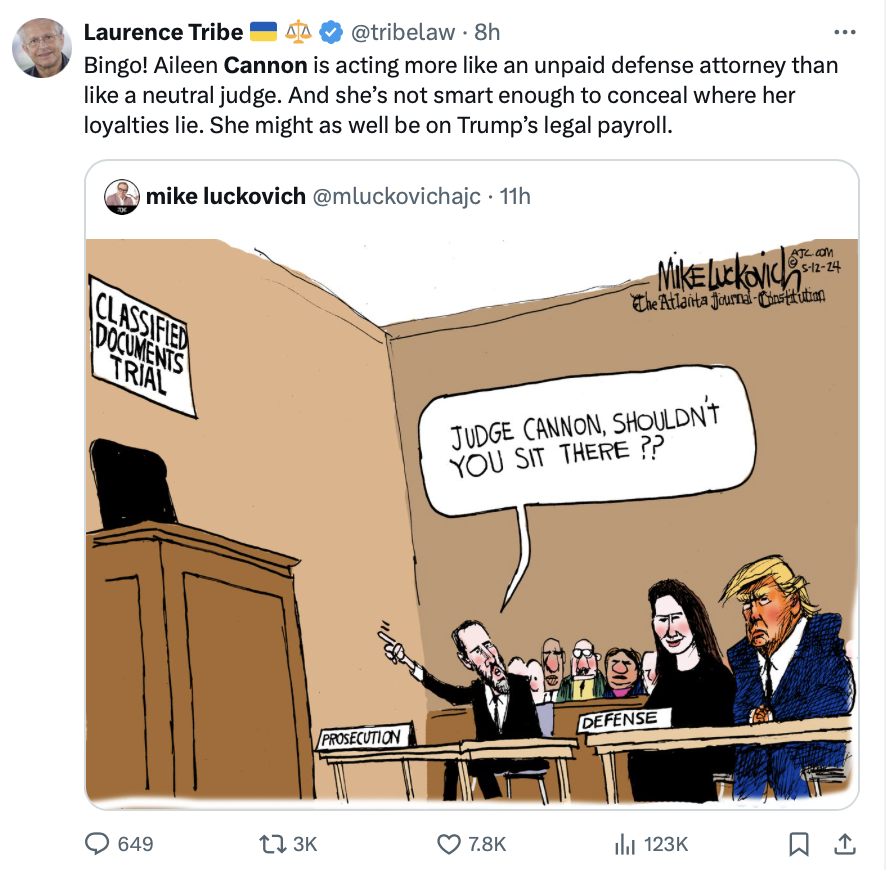*Published with the generous permission of Teri Kanefield. Read all of her writing here.
By Teri Kanefield
Whatever Happened to All Those Lawyer Jokes?
After earning my Master’s in English and creative writing, I taught English composition for a few years at U.C. Davis, and then I moved into a tenure-track position teaching English in a community college. About the time I was awarded tenure, I decided to resign and go to law school. This caused some shock among my colleagues. Nobody resigns a tenured position, they said.
After I made my announcement, I received lovely thank-you cards from students, which I hung in my office. One day, a colleague read them. He then offered me some advice. “Teri, if you enjoy being adored, you should not go to law school.”
I had been reading about Thurgood Marshall, Belva Lockwood, Clarence Darrow, and Pauli Murray. Atticus Finch was my literary hero.
Me: “Wait, what?! Lawyers are not adored?”
He turned to look at me. “Why do you think there are all those lawyer jokes?” he asked.
Me (earnestly), “Maybe because people are jealous of the good lawyers can do?”
There was a long silence. It’s hard to describe the way he looked at me. I assume he was trying to figure out if I was serious.
For two summers during law school, while I was trying to find my way (and figure out how to pay back my loans) I took summer associate positions in Big Law where I learned firsthand the reason for all those lawyer jokes.
But it turns out that lawyers and former judges who go on TV and social media to offer their opinions and predictions can — if they do it right — be adored. TV contracts can be lucrative. Substack and YouTube make it easy to monetize, so if they do it right, they can be both wealthy and widely adored, unlike humble English instructors who must settle for lovely thank-you notes.
Peter Arenella in his 1998 piece “The Perils of TV Legal Punditry” explains how to do it right. The pundit must deliver “scorecard” updates about which side is winning and “sound-bite analysis of complex, nuances problems.”
Pundits don’t have to be good lawyers. They don’t even have to know what they are talking about. They must, however, be able to “generate heated debate.” If the heated debate is over “pseudo-issues,” that’s okay too, as long as the debate “creates visual entertainment” and produces strong emotions in the audience.

Finally, he says the very fact that these pundits will answer “scorecard” questions “raises troubling questions about the pundit’s competence and ethics.”
This week, someone tagged me on Mastodon with this question:
Hi Teri, I believe Mastodon would love to hear your take on Judge Cannon “indefinitely” suspending the MAL documents case.
I decided not to answer the question. I suspected that a narrative had taken form and I was being asked to confirm or contradict that narrative.
From 2021 until 2023, the narrative was:
Our team is losing because there should have been indictments by now and indictments mean accountability! We are losing because Merrick Garland is incompetent or corrupt and he must be fired. The investigation is taking so long because the entire legal system is corrupt and broken.
(If you believe that, click here and start reading.)
The stakes were high and the story was a dramatic one:
Democracy depends on Trump being indicted soon! The election will be won or lost depending on Trump indictments. If Trump is not brought to trial and convicted before the election, it means that the legal system is broken and democracy will be destroyed.
(If you believe that, click here and start reading.)
After indictments were filed, the narrative shifted from, “Our team is losing because Garland is screwing up,” to:
A glance at the headlines told me that a narrative had indeed formed about Judge Cannon’s orders. The narrative was that she was suspending the trial because she was corrupt and was offering Trump a victory.
I read past the headlines and found this:
“The Court … determines that finalization of a trial date at this juncture—before resolution of the myriad and interconnected pre-trial and CIPA issues remaining and forthcoming—would be imprudent and inconsistent with the Court’s duty to fully and fairly consider the various pending pre-trial motions before the Court, critical CIPA issues, and additional pretrial and trial preparations necessary to present this case to a jury.”
“The Court therefore vacates the current May 20, 2024, trial date (and associated calendar call), to be reset by separate order following resolution of the matters before the Court, consistent with Defendants’ right to due process and the public’s interest in the fair and efficient administration of justice.“
Other than “critical CIPA” issues, I saw nothing in the judge’s order that requires expert decoding. In the age of Google, it’s easy to find out that CIPA refers to the Classified Information Procedures Act. You don’t need a lawyer to tell you that prosecuting someone for mishandling classified documents is more complicated than, say, prosecuting someone for shoplifting.
From the way the question to me was phrased, I knew I was supposed to do one of two things:
Keep in mind that these 3 things can be true at the same time:
From someone who spends more time on social media than I do, I learned that people “lost their heads” over Cannon’s order removing the case from the calendar. A glance at Twitter told me that people were indeed losing their heads.
Someone on social media said to me, “I’ve learned from you to stay away from rage-baiting but I was still enraged by Judge Cannon’s order.” The problem, of course, is that media is in disruption and even well-established print media sources often rely on clicks to generate revenue. As Facebook Francis Haugen explained, “angry content” is more likely to receive engagement.
In other words, because of our media disruption and fragmenting of news audiences, news reporting often resembles scorecard analysis. The goal of a headline is to get you to click.
The facts, however, are there for people willing to read past the headlines.
Curious, I checked in on the usual widely adored lawyers who are good at reflecting back the accepted narrative.

And look at all that adoration! Almost 8,000 likes. “Don’t go to law school if you like being adored,” my community college colleague had said. Bah!But Teri! We are not lawyers and we want your insight and experience! We want to know what you think of Cannon’s decision!
I will tell you a secret. You don’t need a lawyer to help you make sense of Cannon’s decision. If you feel confused it’s because the pundits are confusing you instead of educating you. Media outlets present enough conflicting opinions to confuse anyone. Then, when people feel confused, they turn to the pundits, who offer scorecard analysis that keeps them confused and riled. See how self-serving it is?
If enough people learn the secret — you don’t need lawyers to help you understand the news — pundits will be out of business. There are there to entertain you.
What! Being out of my mind with worry isn’t entertaining!
I taught fiction writing before law school. There is a simple formula for creating suspense and keeping readers turning the pages: Give the reader something to worry about. Readers of suspense fiction love when they have something to worry about.
What is happening in the Cannon matter is quite simple. The trial will not begin in May. If you want to know whether this is worth losing your head over, you might ask,
Is it unusual for complex white collar cases and national security cases to take a long time to get to trial?
If someone asked me that, I would say, “I don’t know any more about it than you do. My practice was limited to representing indigents on appeal, which means that I didn’t do white-collar crime. But my understanding from the complex high profile cases I know about is that it is not unusual for it to take a very long time for complex cases to come to trial.”
If I wanted to know more, I’d consult Professor Google, get a list of complex national security cases, and find out when the indictments were filed and when the trials started. Or I’d start with a high profile white collar case like Enron and look up the date the indictment was filed and the date the trial started. (I did this and learned it was almost two years from indictment to jury selection.)
Decoding isn’t hard in the age of the Internet if you ask the right questions. The right questions are attempts to decode the news. If you want answers, it’s as simple as that.
If, instead, you want to be enthralled by the play-by-play game of whether our team is winning, you can turn on your TV or open any social media app (and refuse to read past sensational headlines) and have fun losing your head each time there is a ruling your team doesn’t like.
One person on Mastodon asked if I thought it was “normal” for someone to violate a gag order 10 times and not be in jail by noon. I refused to answer because it was a loaded question. When I refused to answer, the person said,
I’m sad that you won’t chat about this stuff anymore, it’s one of the main reasons I followed you years ago because I appreciated your reasoned approach on these subjects.
I wasn’t “chatting.” I was spending hundreds of hours putting together FAQ pages to refute the conventional narratives. If someone repeated a rage-inducing simplification about criminal law, I sent them to this page. If someone offered a rage-inducing simplification about the DOJ investigation, I sent them to this page.
I can tell you from experience that if you dare go against the collective thinking, you’d better come with receipts because people will be furious. Recipts look like this.
It takes a lot more time and effort to refute a rage-inducing simplification than it does to toss one out to a million followers and stir a hornet’s nest of rage.
I did the work because I naively believed that if indictments were filed, there would come a collective moment of reckoning. The legal pundits who had been misleading the public about the investigation would realize they were wrong. The public would realize they were wrong. People would magically become interested in facts instead of scorecard analysis. (I went to law school because I was a naive idealist so that hasn’t changed.)
The same pundits who misled the public for two years are back on TV riling them about the trials. As a result, I get loaded questions like, “Is it normal for Trump not to have been thrown in jail by now?”
Writing FAQ pages each time the conventional narrative changes is a fool’s game because it never ends. It’s like running on a treadmill or chasing a tail.
You really don’t need anyone to decode the news for you. Legal dictionaries are online. If you want to know more about how the legal system works, you will not learn that from sound bites or scorecard analysis. You will find that in good books.
Meanwhile, have you heard any good lawyer jokes lately?
Why I Shut Down My Comment Section
This is my personal website so I need to moderate the comments, and the task was becoming too time-consuming. This way I can publish my blog on Saturday and take off Saturday evening and Sunday. I have deadlines with my next book and limited time.
But I miss reading people’s comments. I often get ideas for blog posts from the comments. I probably won’t answer (remember! I have book deadlines!) but I promise to read them.












